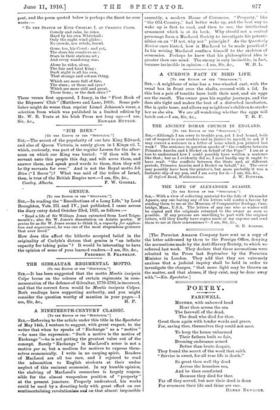A NINETEENTH-CENTURY CLASSIC.
[To THE EDITOR OF THE "SPECTATOR."] Sin,—Referring to the article under this title in the Spectator of May 14th, I venture to suggest, with great respect, to the writer that when he speaks of "Exchange" as a " motive " —he uses the expression: "Such a motive is the motive of Exchange "—he is not getting the greatest value out of the concept. Surely " Exchange " in MacLeod's sense is not a motive per se, but a medium for motives to express them- selves economically. I write in no carping spirit. Readers of MacLeod are all too rare, and I rejoiced to read the admonition to English students at their undue neglect of this eminent economist. In my humble opinion, the shelving of MacLeod's researches is largely respon- sible for the almost weaponless position of " property" at the present juncture. Properly understood, his works could be used by a directing body with great effect on our sentimentalising revolutionists and on that almost impossible assembly, a modern House of Commons. "Property," like " the Old Country,", had better wake up, and the best way to wake up is first to read, and then to use, the intellectual armament which is at its beck. Why should not a central personage form a MacLeod Society to investigate his potenti- alities on an "If not, why not" principle ? As the Quarterly Review once hinted, how is MacLeod to be made practical ? In his writing MacLeod confines himself to the skeleton of economics. Perhaps he knew that his philosophical idea is greater than one mind. The enemy is only invincible, in fact,
because invincible in opinion.—I am, Sir, &c., W. B. L.














































 Previous page
Previous page